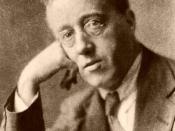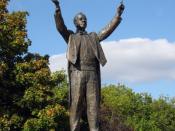Gustavus Theodore von Holst (he dropped the "von" in 1918) was born in Cheltenham, England, in 1874. He died in 1934, four months short of his sixtieth birthday, from a concussion suffered in a backward fall from the conductor's podium, from which he never fully recovered.. His grandfather, Gustavus von Holst of Riga, Latvia, a composer of elegant music for the harp, moved to England and became a fashionable harp teacher. Holst's father Adolph, a pianist, organist and choirmaster, taught piano lessons and gave recitals; his mother, who died when Gustav was only eight, was a singer. Holst was taught to play the piano and violin, and began to compose when he was about twelve.
Holst was deeply influenced by countryside and folksong that originated in England, and adopted a consciously nationalist style in his music. His great interest in English mysticism can be heard in his settings of Choral Hymns from the "Rig Veda" and his short opera "Savitri."
This genre usually consists of instruments that represent England and tell a story of some sort of English historical event. Other composers that contributed to this genre include "The Battle Cry Of Freedom" arranged by Jay Bocook, "The Black Horse Troop" composed by Frederick Fennel. Holst also co-wrote a book on the subject with his best friend Ralph Vaughan Williams called "every subject under the sun from the lowest note of the double bassoon to ... Thomas Hardy's 'Jude the Obscure'."
Holst was a more avid choral conductor and in 1905, Holst was of appointed Director of Music at St. Paul's Girls School in Hammersmith where he kept this job for the rest his life. At this school is where he composed most of his famous choral pieces such as "Hymns from the Rig Veda", "Savitri", and "The Cloud Messenger".



Very well explained!
I really needed information on this composer and your essay helped alot. Thanks you!!
0 out of 0 people found this comment useful.